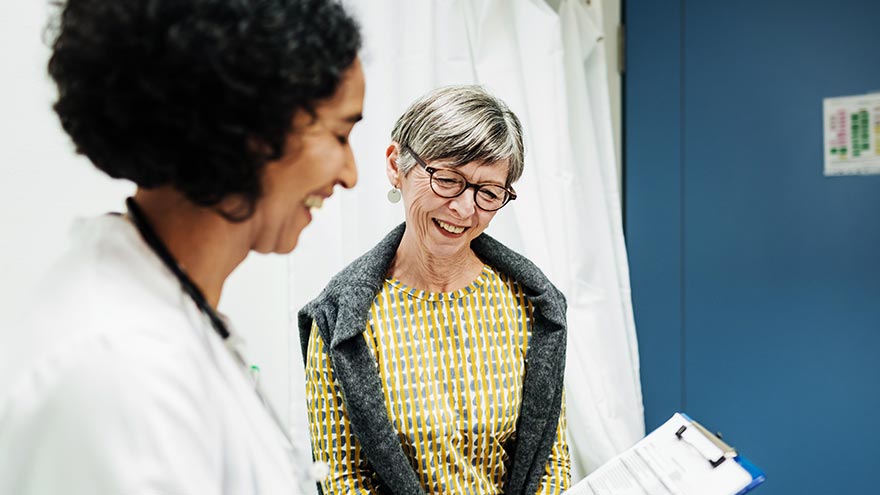Search
-
Think Outside the Box: Healthy, Creative School Lunch Hacks
Gone are the days of soggy PB&Js on white bread: Today’s school lunch is your chance to create a healthy, colorful midday meal! Here are a few simple tips, a week of lunch ideas and a shopping list to help you pack a lunch that won’t be offered up for trade during tomorrow’s lunch hour. While school lunches are getting healthier, packing and taking a lunch to school will ensure that your child is getting a healthy, well-balanced meal. Making lunches should be a team effort. Your kids can help pack their lunches by spreading on condiments or putting food in containers. To save time in the morning, pack lunches the night before. The following are a few suggested items you can use to ensure your child is eating a tasty but nutritious lunch: Main dishes Lunch meat and lowfat cheese roll ups English muffin pizzas Sandwich wraps – meat, cheese and veggies in a whole grain tortilla Pita pockets stuffed with grilled chicken and vegetables Soup Chef salad with spinach, veggies, cheese, lunch meat and dressing Tuna or chicken salad on a mini bagel Snacks and sides Fresh or dried fruit Natural apple sauce Baked tortilla chips and salsa Veggie sticks and hummus Cheese slices or string cheese with whole grain crackers Homemade trail mix with nuts, seeds and raisins Pudding Homemade fruit roll ups Popcorn (add different toppings such as salt, garlic, cinnamon, sugar or cayenne pepper) Drinks Water If you child doesn’t like plain water, try adding a few slices of fresh fruit (strawberries, lime, lemon) for more flavor. School Lunch Menu: Day-By-Day We’ve put together a week’s worth of colorful, fun and healthy school lunch ideas your kids will love. And we’ve also created a shopping list to help you easily locate all the ingredients on your weekend shopping trip. Monday: Turkey BLTA Roll-ups Roll-up Ingredients Turkey, cold cuts Bacon Avocado Tomatoes Side Dish Choices Blueberries Cucumbers Carrot sticks Tuesday: Bacon & Cucumber Sandwich Sandwich Ingredients Whole wheat English muffin Cucumber Bacon Side Dish Choices Apples slices Strawberries Vanilla yogurt mixed with sprinkled cinnamon Wednesday: DIY Lunchables Lunchables Ingredients Crackers Turkey, cold cuts Cheese Side Dish Choices Blueberries Carrots Cucumber Thursday: Veggie Grilled Cheese Veggie Grilled Cheese Ingredients English muffin Cheese Tomato Spinach leaves Avocado Side Dish Choices Apples slices Strawberries Vanilla yogurt mixed with sprinkled cinnamon Tomatoes Friday: DIY Pizzas DIY Pizza Ingredients 2 toasted English muffins Pizza sauce Cheese Turkey pepperoni Side Dish Choices Celery Black olives Shopping List (under 20 items) Cold section: Dairy 1 large container of vanilla yogurt 1 package of your favorite cheese Cold section: Deli meats 1 package of turkey pepperoni 1 package bacon 1 package turkey cold cuts Inside aisles Whole wheat English muffins 1 can of whole black olives 1 jar of pizza sauce 1 box of whole wheat or multigrain crackers Produce department 1 cucumber 1 stalk of celery 2 apples 1 container of strawberries 1 avocado 2 tomatoes 1 bunch of spinach leaves 1 container of blueberries 2 carrots For more healthy school lunch box options, visit our Kids Health & Nutrition board on Pinterest.
Read More About Think Outside the Box: Healthy, Creative School Lunch Hacks
-
What Does It Mean to Participate in a Clinical Trial?
Participating in a clinical trial is voluntary and a personal choice. Clinical trials are research studies that involve people and are an important part of patient care. What is a clinical trial? Clinical trials are research studies that involve people, and they are an important part of patient care. There are several different types of clinical trials; some are designed to understand trends in a disease or identify better ways to diagnose a condition, while others determine if a new treatment is safe and works when treating, improving or preventing a health condition. There are over 400,000 clinical trials currently being conducted in the United States, and even more across the world. This includes health conditions such as heart failure, cancer, Parkinson’s Disease, respiratory conditions like COPD, common infections, cystic fibrosis, and many more. Clinical trials lead the healthcare industry to new discoveries that contribute to reliable and exact care, improving healthcare quality and saving lives. Clinical trials are conducted by a team of researchers, including doctors, pharmacists and clinical research coordinators. These research teams are highly skilled in their specialty areas, often providing traditional patient care and seeing research patients in the same day. These teams are responsible for making sure the clinical trial is completed correctly, and their patients are their top priority. Why should I consider participating in a clinical trial? Participating in a clinical trial is voluntary and a personal choice. There are many reasons why patients decide to get involved in clinical research. While many clinical trials are designed for patients who have a certain health condition, many studies also ask healthy volunteers to contribute in order to compare health outcomes. Clinical trials are also for patients at all different stages of their diagnosis. Depending on the specific study, the patient may receive access to a new cutting-edge treatment before it is widely available. When patients join a clinical trial, the research team becomes a health partner dedicated to their health and well-being. When patients join a clinical trial, they make an informed decision in their healthcare by weighing all available options in addition to routine treatments. Research participants know that they are contributing meaningfully and helping other patients like them. Where can I find more information about clinical trials at Renown Health? Renown Health’s mission is to make a genuine difference in the health and well-being of the communities we serve. Renown’s clinical trial portfolio offers leading care options to patients in northern Nevada, close to home, in a variety of specialties. Contact the Renown Clinical Research Office for more information on clinical trials available to you!
Read More About What Does It Mean to Participate in a Clinical Trial?
-
Top 5 Misconceptions About Clinical Trials
There are many misconceptions about clinical research, so we have unpacked a few common myths we hear to help you make an informed decision in your healthcare. Misconception #1: If I join a clinical trial, I’ll just be a guinea pig. Quite the opposite is true! Through honest and respectful conversation, we ensure all participants are informed of the benefits and risks associated with the clinical trial during the informed consent process. Being in a clinical trial is voluntary, and we respect our patients’ decision to join or decline to participate in the clinical trial. You can always change your mind at any time as well. When patients join a clinical trial, they receive an additional team of healthcare professionals, including additional physicians, pharmacists and research coordinators, dedicated to their safety and well-being. This means that clinical trial participants often receive more support than they would in the standard treatment setting. Misconception #2: Clinical trials are too dangerous because they use new treatments that haven’t been tested. We recognize that there are different levels of risk associated with participating in a clinical trial depending on the type of study. However, new treatments are only reviewed through clinical trials after they have gone through extensive testing. New treatments that do not show promising results for safety and potential benefit during laboratory testing do not receive approval to begin clinical trials. Your research team reviews any expected benefits and risks identified from previous studies during the informed consent process, as well as any updates that occur throughout the duration of the clinical trial. The research team stays in close contact with you during the entire process, documenting and treating any side effects that you experience for both your safety and the safety of participants like you. Misconception #3: I don't want to join a trial because I could be wasting my time receiving a placebo. A placebo is a substance that has no therapeutic effect, sometimes called a “sugar pill.” Participants who receive a placebo during a clinical trial are very important, helping researchers definitively determine the specific good and bad effects of the new medication. Many clinical trials that involve a placebo also offer what is called an open label extension or cross-over study. Cross-over studies ensure that anyone taking the placebo can begin receiving the new medication, often for several years. Cross-over studies help clinician researchers understand the long-term effects of a medication while also giving patients free access to novel care for several months and even years.


